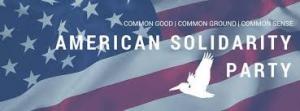Brian Carroll of California is the American Solidarity Party nominee for the 2020 presidential election. Mr. Carroll got the nod from the party’s eligible voters using Survey Monkey last September 9, sometime after which [self-disclosure] I was surprised to find I had accepted the position of (temporary) treasurer for his campaign. Okay, I’m sometimes impulsive.
But let’s see: Brian Carroll? Yeah, I didn’t know who he is either. But that’s my fault. A good deal of the business of the ASP is done online or at Facebook and places and at my age, face it, sometimes there are just too many interfaces to face with.
I first heard of the ASP in the 2016 electoral campaign at First Things. The total 2016 ASP national presidential vote amounted to .005%. Since I’m citing this by memory, I may have inserted an extra zero, or omitted one, but Mr. Carroll clearly has only one way to go from there.
It is a strange little party, if the truth be known, but I am a member for all that, even if a bad one. I wasn’t yet eligible this year to vote for any nominee, not that I had followed any of them. One may join without renouncing one’s present party affiliation. Honest, I can’t quite break that tie so I hadn’t quite edged into the ASP. But to show you how isolating a third party can be, there is at least one other ASP member in Kansas City, Missouri. We’ve never met. We did make an appointment to have lunch but, I forget, something arose and we had to cancel. The summer for me has been too messy to get rescheduled. Sin ce I haven’t heard from him, his too, I’d guess. But he is on my list. There is an ASP Missouri state coordinator somewhere. If I look I could find the name but, like I said, the summer has been a mess.
ce I haven’t heard from him, his too, I’d guess. But he is on my list. There is an ASP Missouri state coordinator somewhere. If I look I could find the name but, like I said, the summer has been a mess.
When I say it is a strange little party I mean to ask, what would you expect? This is an outfit that is neither Democrat nor Republican, nor even an association of independent voters but it is otherwise an organized party with incorporation papers and everything, and it jabs at everyone right or left of the center.
The ASP describes itself as a Christian democratic party, something along the European post-World War II model that arose. The major platform points can be found here: The two salient elements are: a consistent life ethic (pro-life, anti-death penalty), and economic distributism (an economic philosophy based in Christian social teaching; you’ll have to look that up yourself). I’d guess too the word “Christian” frightens any number of people, usually for the wrong reasons but at least it isn’t part of the party name.
Broadly though and very loosely, if you can think of a band of pro-life social democrats bent on eliminating abortion and capital punishment while erecting an economic system that might be called “capitalist socialism” (or maybe “social capitalism”) you would not be far wrong. That of course depends first on how close my definition fits.
Probably, I am not doing the ASP any justice in describing their positions. Yet for all that, I cannot stomach the Democrat extremes on abortion, and while I thoroughly enjoy Trump’s unfiltered ways, I am as undecided now as I was in 2016. I do long for an alternative.
You’d think a third way – center-left economically, center right socially – would gobble up the vote. Poll after poll points to a majority of Americans who can be described as economically moderate-to-progressive while simultaneously also being center-right socially. That’s what the ASP is said to be aiming at, a sweet spot between hard margins.
Somewhere between disaffected Democrats and equally disaffected Republicans, the thinking goes one might find an existing niche that is neither Green nor Libertarian.
So what are the handicaps facing the ASP? Just about everything.
The ASP does not have:
1) money, which means it does not have
2) media access (nor, so far as I know, much of a media plan for getting it)
3) local candidates to run for local office (the only ASP officeholder presently is the city attorney in Sheboygan, Wisconsin).
4) I did mention money, right, and
5) ballot access.
The 2016 ASP presidential nominee, Michael A. Maturen, received 6,662 votes from the 25 states where he was permitted to appear on the ballot. That means he was not on the ballot in 25 others — a whole other kettle of fish — suffice it to say that, while Republicans and Democrats may clash on voter access, they gleefully combine to keep obstreperous candidates off the ballot. I’m a “let ‘em all in” kind of guy, myself, whether we’re talking candidates or immigrants, but I digress.
If I were any sort of a strategist for a third party, I would aim for as many local offices as possible: city council, county commissioner, state representative, congressional seats. Sacrificial presidential candidates may have their place, but national campaigns require a lot of energy — most of it wasted — and getting the presidential nomination out of a small third party can generate as much divisive intra-party agitation as a big party can. Third party presidential candidates do not generate much if any national news, but third party local candidates combined may get more press inches than the entire party receives nationally, and local advertising is cheaper while attracting local press attention.
Without that the ASP has little ground movement. Campaigns produce party supporters, party supporters generate money, money publicizes campaigns, campaign supporters breed candidates for the next election. That is something of how it goes.
Then there is history. New political parties with national appeal are genuinely rare. Major parties arise historically upon the collapse of an existing party. Democrats arose on the ashes of the Democratic-Republican Party, 1829. Andrew Jackson was the first identifiable Democrat president. Republicans formed following the Kansas-Nebraska Act, 1854, which essentially opened all territories to the expansion of slavery and it splintered the Whig Party. The abolitionist vote went Republican. By 1860, Lincoln was the man. Lesson learned: One party must fall that another may rise to replace it.
This is also the reason most third parties have short histories; formed around a single issue they lack any broader appeal. The longest-lived third parties become antiquarian curiosities. It is chastening to think the oldest surviving third party in the United States is the Prohibition Party (est. 1869). Their last presidential nominee was selected though a telephone conference call. The ASP’s Survey Monkey sounds absolutely futuristic.
America has always been a two-party democracy. The issues that necessarily crumble a major party out of existence must be so defining as to demand a viable replacement. Even if coalescing factors favoring the ASP exist, the ASP still has a tough hill to climb.
Before entering seminary and becoming a Lutheran pastor (before becoming Roman Catholic), Russell E. Saltzman was (in order) a newspaper reporter, press secretary to a member of Congress, and deputy secretary of state of Kansas. He can be reached at [email protected].












